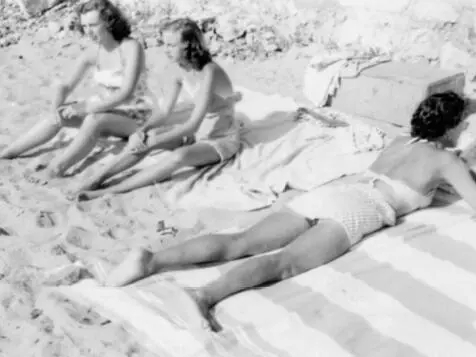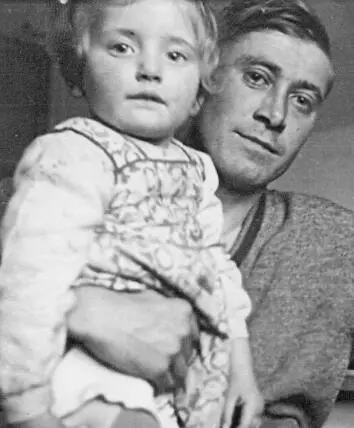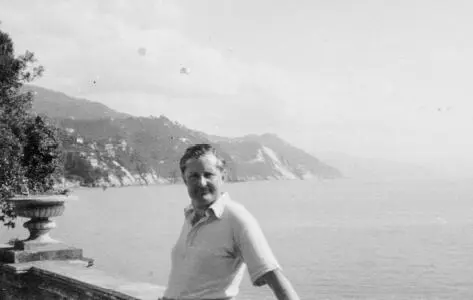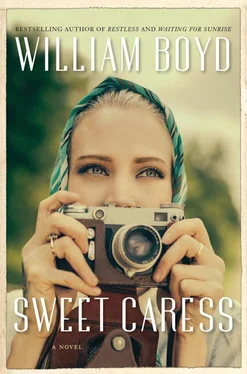We spent two weeks with them in 1965. The girls had just done their A levels. We were there in July and every two days or so we’d drive down to the wide beach at Viareggio and spend a day by the sea. Greville took this photograph of the three of us. The three Farr women, he called us.

Me and the twins, Viareggio, 1965.
I remember buying a book, a popular military history about the last months of the Second World War called Desperate Endgame: British Armies in the Final Year, 1944–1945. There was a page or two dedicated to the battle for Wesel during Operation Plunder. All it had to say relevant to Sholto was this:
15 Commando, under the command of Lt Col Lord Farr, encountered stiff resistance at a crossroads to the east of the town centre. It took some hours to clear out the strongpoint. At daybreak 15 Commando gathered in a small park where it was discovered that their casualties were six dead, fourteen wounded. The assault on Wesel was a copybook Commando action: in the ferocious street fighting they had proved their mettle.
No comment.
I remember once we were having a picnic, me and the girls, out at the foot of Beinn Morr on a windy, sunny day, the grass bleached and bending in the tugging breeze, and Blythe, who was sitting beside me, asked if we could play Greville’s Game. At that time of her life she was always asking me if we could play the game with her. Annie couldn’t be bothered joining in — she thought it was ‘stupid’.
‘All right,’ I said. ‘What about that little river?’
‘Wet, brown, fast, silky. Too easy, Ma. Let’s do people.’
‘Mr Kinloss. Remember him?’
‘Fat, grey, polite, mysterious.’
‘Good. Yes! I never thought of that.’ She was fast, Blythe, never taking more than a few seconds to come up with her adjectives.
‘Now it’s your turn,’ she said, brightly. ‘Do me. And be honest.’
‘That’s not fair.’
‘No, you do me, then I’ll do you.’
I felt a little shadow of worry — this could have consequences, I realised, not necessarily welcome, but there was no avoiding the issue. Annie had wandered off with her bottle of lemonade and was tossing pebbles into the shallow burn that gurgled by our picnic spot — she couldn’t hear our conversation, I was sure.
I looked at Blythe.
‘Pretty, stubborn, clever, complicated.’
She thought about this, frowning, making a little moue with her lips, weighing up the epithets and seeing if they fitted.
‘Now you do me,’ I said.
‘Pretty, stubborn, clever, complicated,’ she said instantly.
I laughed and she joined in but I had received the message — especially as she now glanced over her shoulder to make sure that Annie hadn’t overheard. I was beginning to think she’d laid a trap for me — and now there was a private bond between us. She was telling me — so I reasoned — like mother, like daughter. She was probably right.
‘Now do Andrew Farr,’ I said, wanting to break the mood.
‘Dull, shifty, boring, dominated.’
Annie wandered over.
‘What are you two laughing at?’ she asked, irritated.
I remember receiving the A level results for the twins in the post and undergoing the ritual opening of the envelopes at the breakfast table. Annie had done well; Blythe less so — but she said she didn’t care. She was going to be a musician, A levels were of no use. I agreed.
Annie secured a place at one of the new universities, Sussex, to read for a degree entitled ‘International Relations’, whatever that was.
I took her out to dinner in Oban, to celebrate (Blythe was away, somewhere). I looked at her across the table and allowed my love for serious Annie to brim. She had a long thin face — Blythe’s was rounder, prettier — and she was taller than Blythe, also.
‘Ma, would you mind if I asked you a favour?’ she said.
‘Anything.’
‘You know that, because of Papa’s title, I’m “the Honourable” Andra Farr?’
‘Yes.’
‘Well, I don’t ever want to be called that. I got a letter from the university and it called me “the Honourable”. I was so embarrassed.’
‘That’s all right, darling. I understand.’
‘I just don’t want that title ever to be used. Ever again. No disrespect to Papa, and all that.’
‘Of course. I don’t much like being “Lady Farr” either.’ I squeezed her hand. ‘It’s expunged.’
At the university, in her hall of residence, she was less than an hour from Beckburrow and, much to my surprise, went there every other weekend or so to spend time with her grandmother, who was old, and ailing, but still feistily alert. While Annie was there she unearthed a cache of my early photographs, and others of the period. She sent me a small selection: there was a tattered one of me when I was twenty, standing in the pond at Beckburrow, posing; and one of me as a little girl with my father, taken by Greville. It must be in 1913 or 1914, just before he went off to war.

I remember one odd moment. Blythe and I were out for a walk on the beach with Flim — Annie had gone south to check out her new hall of residence.
‘I hate that bitch, Benedicta,’ Blythe said, all of a sudden.
‘Well, so do I,’ I admitted. ‘Nasty piece of work. Grasping, smug, malicious, insincere.’
‘Do you think if someone killed her anyone would mind for one minute? For one second?’
‘Don’t say that sort of thing, Blythe, not even as a joke.’
‘It’s not a joke. She kicked us out.’
I took her hand — she was flushed, there was a real rage building.
‘It doesn’t matter, darling. We wouldn’t have been happy there, at the House. It was never really our home.’
It seemed to mollify her. She was leaving as well, the next day, for London, to stay with Dido and Reggie Southover at their rather grand house on Camden Hill. Blythe wanted to audition for folk bands or rock groups — she didn’t care, keyboard or guitar, she just wanted to play music. Dido was her inspiration and they became quite close. There was a musical gene in the Clay family, shared by Dido and Blythe — they were different from the rest of us, the littérateurs , the photographers.
I remember I had a rare letter from Charbonneau telling me the news of the birth of his second child — a son, Luc. He enclosed a photograph of himself, ‘So you won’t forget what I look like.’ I saw he’d put on weight and grown a moustache again. He was standing on a terrace on the Italian Riviera, somewhere, and I supposed he vaguely wanted me to feel jealous about the high life he was leading. I couldn’t help thinking he didn’t look particularly happy.

Jean-Baptiste Charbonneau, 1962.
*
THE BARRANDALE JOURNAL 1977
I liked to quiz Greer about her old subject, cosmology, as there were aspects of it that intrigued me, to her occasional exasperation.
‘So the Big Bang happened thirteen billion years ago?’ I once asked her, when we were out for a walk.
‘Thirteen point eight billion years ago. Give or take a day or two,’ she said. ‘Oh God, you’re going to ask me more questions, aren’t you?’
‘Because I’m interested,’ I said. ‘You’ve stimulated my interest, Greer. You should be pleased.’
Читать дальше















